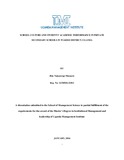| dc.description.abstract | The study examined influence of school culture on student academic performance in private
secondary schools in Wakiso district. It sought to achieve three research objectives notably: to
examine the influence of school symbolic behaviors, school environment and strategic direction
on students’ academic performance. The study adopted a cross-sectional design in which both
quantitative and qualitative methods of data collection were used to obtain data from a sample of
92 respondents who included head teachers, teachers and students. Data were collected using
questionnaires and interviews. At univariate level, the quantitative data were presented in form
of means to show the central tendency of responses. At bivariate level, the Pearson correlations
and simple linear regressions were used to show the direction of relationship and the magnitude
at which the independent variables affect the dependent variable. Study findings revealed a
positive and significant relationship between each of the three dimensions of school culture (i.e.
symbolic behaviors, school environment and school culture strategic direction) and academic
performance of students. The study thus concluded that the three independent variables have a
positively significant influence in explaining students’ academic performance. On the basis of
the study findings, it was recommended that schools seeking to improve students’ performance
should focus on working diligently to create a healthy school culture. Specifically, school leaders
need to understand the values, practices and norms of the schools which they are leading. By
having this knowledge, they will be able to influence teachers, students and the community to
understand the school symbolic behaviors and they will all work towards a common goal of
improving students’ academic outcomes. In addition, heads of schools should always care and
focus on the specific aspects of the dimensions of school environment that affect the culture of
the school in order promote student achievement. Lastly, the strategic direction of each school should be well articulated, made available and accessible to the school community as a whole. In
terms of research, future research should among others focus on the influence of other
organizational factors influencing the academic performance of students. Such areas could be
community factors, changes in technology, the influence of the media as well as
commercialization of the Education sector. | en_US |

